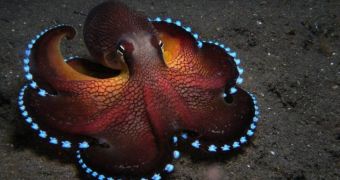Scientists speaking at this month's meeting of the Society for Experimental Biology in Valencia, Spain, argued that octopuses can survive in the freezing waters of the Antarctic thanks to the make-up of their blood.
Red-blooded creatures rely on an iron-based protein named hemoglobin to have their bodies properly oxygenated. The problem is that this protein is only efficient as long as there is plenty of oxygen to go around.
Whenever oxygen levels are low, as is the case in the deep ocean, hemoglobin becomes ineffective, Scientific American explains.
Hence the fact that octopuses also have a copper-based protein called hemocyanin rushing through their veins.
Unlike hemoglobin, this copper-based transporter protein can also function in environments that are poorly oxygenated.
Interestingly enough, octopuses seem able to control how much oxygen the hemocyanin in their bodies attracts and transports, depending on the temperatures they are exposed to.
Specialists say that octopuses are blue-blooded creatures due to the presence of hemocyanin in their bodies.

 14 DAY TRIAL //
14 DAY TRIAL //